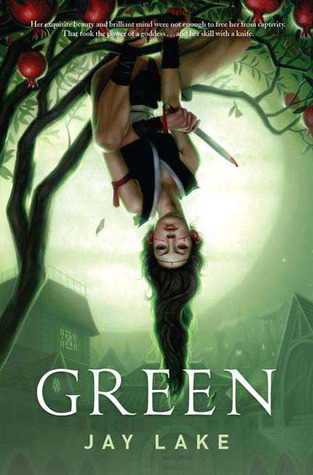
GREEN (Green Universe #1)
JAY LAKE
Tor Books
$15.99 trade paper, available now
Rating: 3.6* of five
The Publisher Says: Her exquisite beauty and brilliant mind were not enough to free her from captivity. That took her skills with a knife, plus the power of a goddess.
She was born in poverty, in a dusty village under the equatorial sun. She does not remember her mother, she does not remember her own name--her earliest clear memory is of the day her father sold her to the tall pale man. In the Court of the Pomegranate Tree, where she was taught the ways of a courtesan…and the skills of an assassin…she was named Emerald, the precious jewel of the Undying Duke’s collection of beauties. She calls herself Green.
The world she inhabits is one of political power and magic, where Gods meddle in the affairs of mortals. At the center of it is the immortal Duke’s city of Copper Downs, which controls all the trade on the Storm Sea. Green has made many enemies, and some secret friends, and she has become a very dangerous woman indeed.
Acclaimed author Jay Lake has created a remarkable character in Green, and evokes a remarkable world in this novel. Green and her struggle to survive and find her own past will live in the reader’s mind a long time after the book is closed.
My Review: And here we have the proof that no author can match one's tastes perfectly. Green is about an adolescent girl whose birth makes her Special.
My very least favorite trope featuring my very least favorite PoV character.
Emerald, aka Green, is an orphan whose father sold her into life as a thing. Females are always things in these stories. She's a well-made thing, in that she's trained in all the arts a woman needs training in...including murder...and she's got the attitude to prove she's as good as any boy.
She lacks ambition.
Her voyage around her world fetches her up in Kalimpura under Mother Jaivai, where her honing is completed. Her return to Selistan, to confront the pale wraith of her past, is a foregone conclusion. Her actions are inevitable. Their outcome is too much to pack in to the confines of one novel, so....
This sounds like something that would be ripe for a hatchet-job from the likes of me. But, as always, it's the way it's done that makes it or breaks it. The story as it's told here is made of small, lovely moments. Green telling us her story directly gives the discovery of the various parts of her world she inhabits a personal immediacy for the reader. The sensory world, while circumscribed, is that much more intense for being personal.
Where that works less well is in the overarching story of what happened to make this world Green inhabits the way it is. A bit like trying to infer the Constitutional Convention of 1787 from what a fourteen-year-old twenty-first century Canadian kid knows and sees.
In the end, with any book introducing a series, the important question is: Do you care about what comes next? Do you want to buy the next book?
To my surprise, yes, I do. Quite a job to make me want to, given my natural disinclination to read books about adolescents as well as fantasy novels.

This work is licensed under a Creative Commons Attribution-NonCommercial-ShareAlike 3.0 Unported License.


